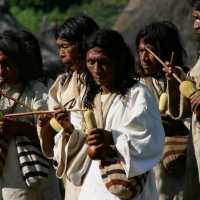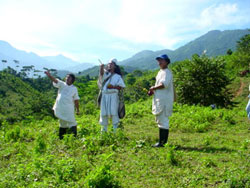|
My web page here is focused on academic -- primarily linguistic but also archaeological/anthropological -- Chibchan issues. However, since there are a number of Chibchan languages still in use, and usually endangered, even the driest most narrowly focused student of Chibchan materials has an interest in current affairs as they involve the remaining speakers (who, if nothing else, are the principal reserve of primary sources for comparative linguistic study). More seriously, there are real issues here that affect real people in the real world, not just some dusty, thousand-year-old names in some old library book, so this is important stuff, reall. Without wanting to mire myself too deeply in political and social issues (there are plenty of online venues for that), I'll briefly mention a few links ....

There are, of course, a number of ethnicities in Northern Colombia who still speak Magdalenic Chibchan languages as their birth tongues. The Kogi, the Ika, and the Wiwa (speakers of Damana) all live in the vicinity of the Sierra Nevada of Santa Marta; the U'wa (speakers of Uw Cuwa, also known as Tunebo) live in the region of the Sierra Nevada de Cocuy Mountains.
There's a good (if brief) online National Geographic article about the Arhuácic-speaking groups of the Sierra Nevada de Santa Marta and some of the issues they face. It includes a link to a pretty PDF map of tribal locations the Sierra Nevada, as well as some links to audio-visual materials.
The Arhuácan-speaking groups, particularly the Kogi, were catapulted to relative fame by a film created through a collaboration between the Kogi and BBC film-maker Alan Ereira (From the Heart of the World - The Elder Brothers' Warning; there was an accompanying book, published as The Heart of the World in the UK and The Elder Brothers in the US). Though film and book were critizized by academics for not adhering to normal ethnographic standards, it wasn't intended as academic ethnography (neither Ereira nor his Kogi colaborators are trained as academic anthropolgists) and is a remarkable and accessible introduction to a modern, contemporary Chibchan-speaking people. Ereira set up the Tairona Heritage Trust as a UK-based charitable organization that supports efforts of indigenous Colombian organization Gonavindua Tairona which represents the various Arhuácan-speaking groups to the outside world. One of the major activities is raising money to buy back ancestral lands. Although pretty much anything in Colombia, especially anything political, is capable of generating literally violent controversy, I can't think of any good reason not to help indigenous communities maintain their cultures and languages.

There's an interesting article by Carolina Ortiz Ricaurte (a scholar who works on indigenous languages in Colombia), about ethnic identity amongst the Arhuácan-speaking groups, "Los guardianes del equilibrio del mundo: La identidad entre los grupos aborígenes de la Sierra Nevada de Santa Marta en Colombia". One is struck by the strangely parallel cases of both 19th-century French anarchists and 1970s-era hippies establishing communes in the Sierra with the basica intention of emulating the Kogi. What can one say but, "Far out!"? The Kogi are famously resistent to outsiders (one has to say, not without reason!) and the same author has another article (in PDF format): "Resistencia y procesos de integración indígenas: El caso de los Kogui de la Sierra Nevada". (Ortiz Ricaurte has a number of important linguistic publications on Chibchan linguistics, alas, not available online!)
TribaLink is an organization that looks to be a "media bridge" between indigenous groups in North and South America, as well as between the traditional and industrialized worlds. It has some information (connected with a new documentary film project) about a visit by some Kogi elders (mámas) to the US, and a meeting between North American native leaders and the Kogi in Colombia. TribaLink is working with Gonavindua Tairona to raise money for a new hospital in the Sierra Nevada de Santa Marta.
The Arhuaco Universe (PDF) is (I think) an English-language translation from Spanish of some essays (written? transcribed) by elders (mámas) from the Ika (sometimes known as the Arhuaco) in connection with the 7th International Poetry Festival in Medellín, June 1997.
Not to forget the last of the Cundiboyacán-speakers, here's the official web site of the U'wa.
|